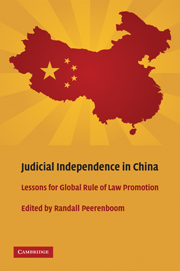Book contents
- Frontmatter
- Contents
- Contributors
- 1 Introduction
- 2 Halfway Home and a Long Way to Go
- 3 A New Approach for Promoting Judicial Independence
- 4 The Party and the Courts
- 5 Judicial Independence in China
- 6 A New Analytic Framework for Understanding and Promoting Judicial Independence in China
- 7 Judicial Independence and the Company Law in the Shanghai Courts
- 8 Local Courts in Western China
- 9 The Judiciary Pushes Back
- 10 Corruption in China's Courts
- 11 A Survey of Commercial Litigation in Shanghai Courts
- 12 Judicial Independence in Authoritarian Regimes
- 13 Judicial Independence in East Asia
- Index
- References
11 - A Survey of Commercial Litigation in Shanghai Courts
Published online by Cambridge University Press: 05 June 2012
- Frontmatter
- Contents
- Contributors
- 1 Introduction
- 2 Halfway Home and a Long Way to Go
- 3 A New Approach for Promoting Judicial Independence
- 4 The Party and the Courts
- 5 Judicial Independence in China
- 6 A New Analytic Framework for Understanding and Promoting Judicial Independence in China
- 7 Judicial Independence and the Company Law in the Shanghai Courts
- 8 Local Courts in Western China
- 9 The Judiciary Pushes Back
- 10 Corruption in China's Courts
- 11 A Survey of Commercial Litigation in Shanghai Courts
- 12 Judicial Independence in Authoritarian Regimes
- 13 Judicial Independence in East Asia
- Index
- References
Summary
The capacity of a legal system to protect property rights is generally considered one of the most important factors in economic development because commercial transactions will become unduly costly and risky in an environment in which contracts cannot be enforced by the state. An independent judiciary, in turn, is generally considered an essential element of an effective legal system and thus necessary for sustained economic growth. Chinese leaders have clearly recognized the critical importance of building a legal infrastructure that will facilitate commercial transactions in an increasingly market-oriented economy; they have also acknowledged the need to enhance the competence, authority, and independence of the judiciary. Yet scholars remain divided on the role of the legal system in development and how well it protects property rights.
How well then is China implementing the declared policy of “ruling the country according to the law”? How are Chinese citizens and corporations responding to the new legal environment? What strategies do they use to win favorable outcomes in court? How independent are the courts in handling commercial cases? What are the sources and impact of outside influence in such cases? How do the parties assess the legal system and their experience in court? This chapter sheds light on these important issues by measuring various aspects of the civil proceedings in basic level and intermediate courts in one of China's leading urban commercial centers.
- Type
- Chapter
- Information
- Judicial Independence in ChinaLessons for Global Rule of Law Promotion, pp. 221 - 233Publisher: Cambridge University PressPrint publication year: 2009
References
- 1
- Cited by

